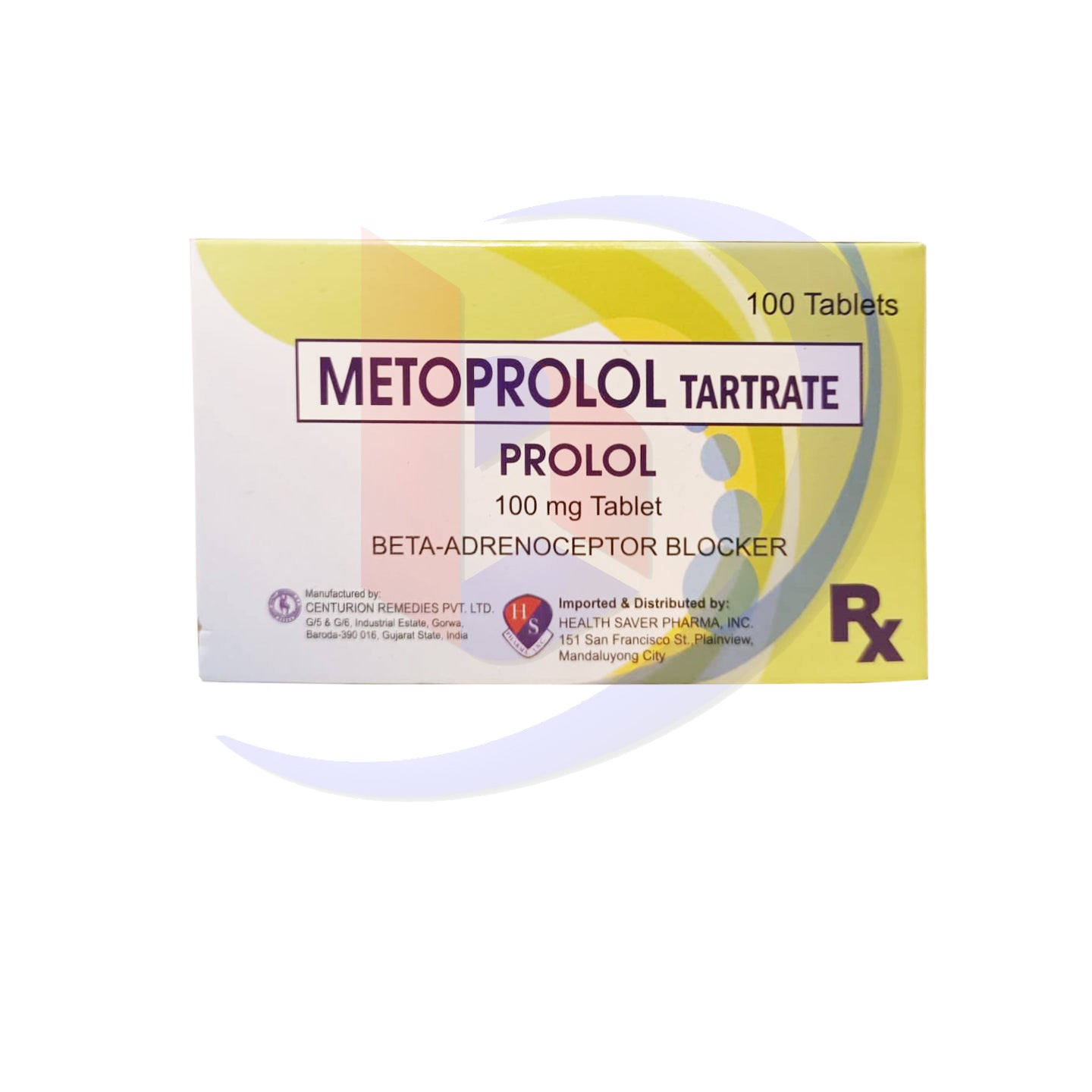Bambang Pharmaceutical Depot Inc.
Metoprolol Tartate (Prolol) 100mg Tablet 100's
Metoprolol Tartate (Prolol) 100mg Tablet 100's
Couldn't load pickup availability
Product Description:
Metoprolol Tartrate (Prolol) is a beta-blocker medication that works by blocking the action of certain chemicals in the body (such as adrenaline or epinephrine) on beta receptors in the heart. This action helps to lower heart rate, reduce blood pressure, and decrease the workload on the heart. Each tablet of Prolol 100mg contains 100 mg of Metoprolol Tartrate and is typically used for the management of cardiovascular conditions.
Prolol 100mg Tablets come in a bottle of 100 tablets, offering an effective long-term solution for treating conditions such as high blood pressure, angina, and heart failure.
Indications:
Metoprolol Tartrate (Prolol) is indicated for the following conditions:
-
Hypertension (High Blood Pressure):
-
Prolol is used to treat high blood pressure by reducing the heart rate and dilating blood vessels, thus lowering blood pressure and reducing the risk of cardiovascular events like stroke or heart attack.
-
-
Angina Pectoris (Chest Pain):
-
It is used to prevent and manage angina, which occurs due to reduced blood flow to the heart muscles. By reducing the heart's demand for oxygen, it helps relieve chest pain.
-
-
Acute Myocardial Infarction (Heart Attack):
-
Metoprolol Tartrate is used to reduce mortality and the risk of complications following a heart attack by slowing the heart rate and decreasing the heart's oxygen consumption.
-
-
Chronic Heart Failure:
-
It is used in the treatment of chronic heart failure, often in combination with other medications, to reduce hospitalizations, improve symptoms, and enhance heart function.
-
-
Arrhythmias (Irregular Heartbeats):
-
It is used to treat and control arrhythmias, particularly atrial fibrillation and ventricular arrhythmias, by controlling heart rate.
-
Dosage:
The usual dosage of Metoprolol Tartrate (Prolol) will depend on the specific condition being treated, but the general recommendations are as follows:
For Hypertension (High Blood Pressure):
-
Initial Dose: Start with 50 mg once daily.
-
Maintenance Dose: May be adjusted based on the patient's response, typically between 100 mg to 200 mg per day, either as a single dose or divided into two doses.
For Angina Pectoris (Chest Pain):
-
Initial Dose: 100 mg once daily.
-
Maintenance Dose: The dose may be adjusted to 200 mg daily, depending on the patient's condition.
For Acute Myocardial Infarction (Heart Attack):
-
Initial Dose: Following a heart attack, an intravenous (IV) dose is often given in the hospital setting, followed by 100 mg orally once or twice daily, as directed by the physician.
For Chronic Heart Failure:
-
Starting Dose: In heart failure, the dose should begin at 12.5 mg to 25 mg daily, and the dose should be gradually increased based on tolerance, with a typical maintenance dose of 100 mg to 200 mg per day.
For Arrhythmias:
-
Initial Dose: 50 mg twice daily, with adjustments depending on heart rate and rhythm control.
Side Effects:
While Metoprolol Tartrate (Prolol) is generally well tolerated, some people may experience side effects. Common and serious side effects include:
Common Side Effects:
-
Fatigue or tiredness.
-
Dizziness or lightheadedness, especially when standing up quickly.
-
Bradycardia (slow heart rate), which may cause fatigue, dizziness, or fainting.
-
Nausea or stomach upset.
-
Cold extremities (hands and feet).
-
Shortness of breath or wheezing (particularly in people with asthma or COPD).
Serious Side Effects (less common, but may occur):
-
Severe Bradycardia (heart rate under 40 beats per minute), leading to dizziness, fainting, or even cardiac arrest.
-
Severe hypotension (low blood pressure), resulting in dizziness, confusion, or fainting.
-
Heart failure symptoms worsening, such as increased shortness of breath, fatigue, or swelling in the legs.
-
Severe allergic reactions (rash, swelling, difficulty breathing).
-
Bronchospasm (tightening of the airways), especially in people with asthma or COPD.
-
Depression or mood changes.
-
Liver dysfunction: Symptoms such as yellowing of the skin or eyes (jaundice), dark urine, or pain in the upper right abdomen.
If any of these serious side effects occur, you should immediately contact a healthcare provider.
Contraindications:
Metoprolol Tartrate (Prolol) should be avoided or used with caution in the following situations:
-
Hypersensitivity: Known allergy to Metoprolol or any other components of the tablet.
-
Severe Bradycardia (slow heart rate): This medication should not be used if the heart rate is less than 45-50 beats per minute.
-
Heart Block (2nd or 3rd degree): Metoprolol should not be used in patients with significant atrioventricular (AV) block without a pacemaker.
-
Severe Heart Failure: It should not be used in patients with acute decompensated heart failure or severe symptoms of heart failure unless under close medical supervision.
-
Asthma or Chronic Obstructive Pulmonary Disease (COPD): Prolol should be avoided in patients with asthma or severe COPD, as it can cause bronchoconstriction (narrowing of the airways), making breathing difficult.
-
Severe Hypotension (Low Blood Pressure): Metoprolol should not be used in patients with significantly low blood pressure.
-
Pheochromocytoma: Metoprolol should be avoided in patients with pheochromocytoma (a tumor of the adrenal glands) unless appropriate alpha-blocker therapy has been administered first.
Precautions:
-
Pregnancy: Metoprolol Tartrate is classified as Category C during pregnancy, meaning it should only be used if the benefits outweigh the risks. It can affect fetal blood flow and heart rate, so it should only be prescribed when necessary.
-
Breastfeeding: Metoprolol passes into breast milk in small amounts. While it is generally considered safe during breastfeeding, it should only be used under the guidance of a healthcare provider.
-
Renal or Hepatic Impairment: Use caution in patients with liver or kidney disease, as Metoprolol is metabolized by the liver and excreted by the kidneys. Dose adjustments may be needed.
-
Diabetes: Metoprolol can mask some symptoms of hypoglycemia (low blood sugar), such as tachycardia (rapid heart rate). Patients with diabetes should carefully monitor their blood glucose levels while on this medication.
-
Discontinuation: Abruptly stopping Metoprolol can cause rebound hypertension or a worsening of angina. It should be gradually tapered under the supervision of a healthcare provider.
Drug Interactions:
Metoprolol Tartrate (Prolol) can interact with other medications, including:
-
Calcium Channel Blockers (e.g., Verapamil, Diltiazem): Concomitant use may lead to severe bradycardia, heart block, and low blood pressure.
-
Clonidine: Abrupt discontinuation of Clonidine while taking Metoprolol can lead to a hypertensive crisis (sudden high blood pressure). Clonidine should be tapered off gradually, not stopped suddenly.
-
Digoxin: Co-administration with Digoxin may cause severe bradycardia (slow heart rate) and requires careful monitoring of heart rate.
-
NSAIDs: Nonsteroidal anti-inflammatory drugs (NSAIDs) may reduce the effectiveness of Metoprolol in lowering blood pressure.
-
Insulin or Oral Hypoglycemics: Metoprolol may mask symptoms of hypoglycemia (low blood sugar), such as tachycardia, so people with diabetes need to monitor their blood sugar closely while using this medication.
Conclusion:
Metoprolol Tartrate (Prolol) 100mg is a beta-blocker used to manage hypertension, angina, heart failure, and certain arrhythmias. While effective in treating these conditions, it comes with a range of potential side effects and contraindications. It's important to follow your healthcare provider's instructions carefully, and if any serious side effects or reactions occur, seek medical attention immediately. Always inform your doctor about any other medications you're taking to avoid harmful interactions.
Share

Product Features
Highlights
Details
Lot #
Expiry Date
"For All Your Pharma And Medical Supply Needs"
-
MEDICINES
We offer large range of generics and branded tablets, capsules, topicals, suppositories, drops or suspensions, inhalers and injections.
-
SUPPLEMENTS
High quality yet very affordable vitamins and minerals, specialty supplements, herbals and botanicals, sports nutrition, and weight management.
-
MEDICAL SUPPLIES
We serve all types of medical supplies needed in clinics, laboratories, and hospitals like cottons, gauze, alcohol, swabs, gloves, bandages, lancets, glucometer, etc.
-
MEDICAL EQUIPMENT
We also serve durable and affordable medical devices and equipment needed in clinics, laboratories and hospitals.
Subscribe to our emails
Be the first to know about new collections and exclusive offers of Bambang Pharmaceutical Depot Inc.


